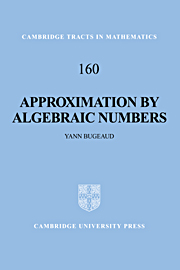Book contents
- Frontmatter
- Contents
- Preface
- Frequently used notation
- 1 Approximation by rational numbers
- 2 Approximation to algebraic numbers
- 3 The classifications of Mahler and Koksma
- 4 Mahler's Conjecture on S-numbers
- 5 Hausdorff dimension of exceptional sets
- 6 Deeper results on the measure of exceptional sets
- 7 On T-numbers and U-numbers
- 8 Other classifications of real and complex numbers
- 9 Approximation in other fields
- 10 Conjectures and open questions
- Appendix A Lemmas on polynomials
- Appendix B Geometry of numbers
- References
- Index
4 - Mahler's Conjecture on S-numbers
Published online by Cambridge University Press: 12 August 2009
- Frontmatter
- Contents
- Preface
- Frequently used notation
- 1 Approximation by rational numbers
- 2 Approximation to algebraic numbers
- 3 The classifications of Mahler and Koksma
- 4 Mahler's Conjecture on S-numbers
- 5 Hausdorff dimension of exceptional sets
- 6 Deeper results on the measure of exceptional sets
- 7 On T-numbers and U-numbers
- 8 Other classifications of real and complex numbers
- 9 Approximation in other fields
- 10 Conjectures and open questions
- Appendix A Lemmas on polynomials
- Appendix B Geometry of numbers
- References
- Index
Summary
In Theorem 3.3, we used the Borel–Cantelli Lemma 1.2 to prove that almost all real numbers ξ are S*-numbers of *-type less than or equal to 1. A similar statement is however much more difficult to establish when we consider Mahler's classification. The first important result in this direction is due to Mahler [377], who showed in 1932 that almost all real numbers ξ satisfy supn≥1 (wn (ξ)/ n) ≤ 4. At the end of [377], he made the conjecture that the upper bound 4 could be replaced by 1.
Until Sprindžuk [536, 537, 538] gave in 1965 a complete affirmative answer to that conjecture, there appeared various improvements of Mahler's result. First, Koksma [333] showed that supn≥1 (wn (ξ) / n) ≤ 3 for almost all real numbers ξ. This has been strengthened by LeVeque [362], who replaced the upper bound 3 in Koksma's result by 2. Later on, refining a method introduced by Kasch and Volkmann [311], Schmidt [501] proved the inequality wn (ξ) ≤ 2n – 7/3 for almost all real numbers ξ and all positive integers n. Lastly, Volkmann [583, 584] showed that wn (ξ) ≤ 4n/3 holds for almost all real numbers ξ and all positive integers n. At the same time, Sprindžuk [533] obtained a slightly stronger result than Volkmann's, shortly before his resolution of Mahler's Conjecture.
- Type
- Chapter
- Information
- Approximation by Algebraic Numbers , pp. 74 - 89Publisher: Cambridge University PressPrint publication year: 2004

